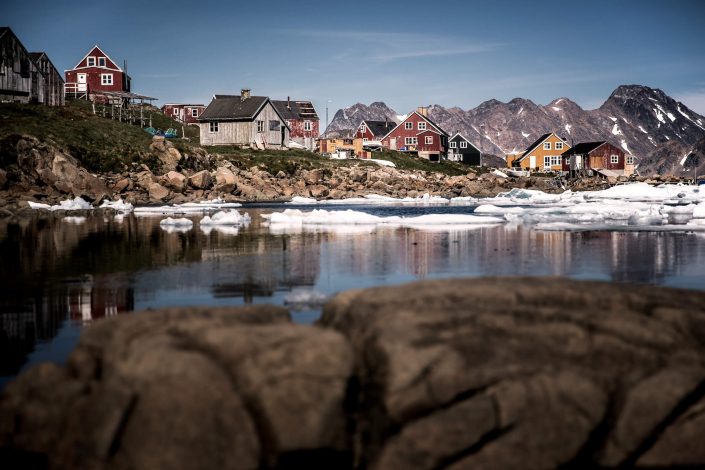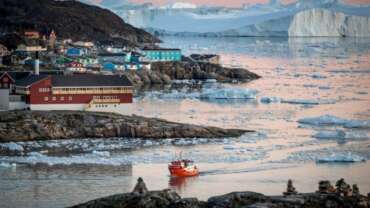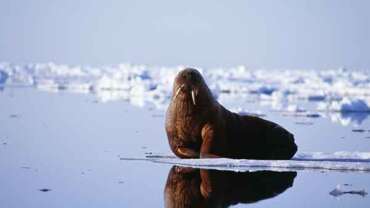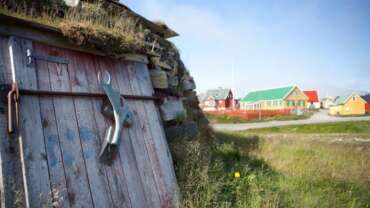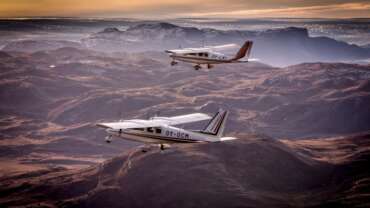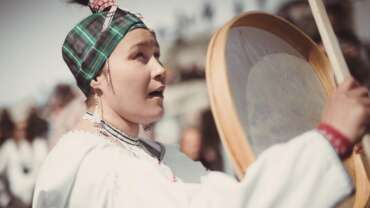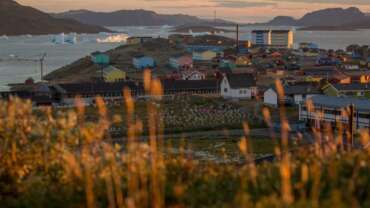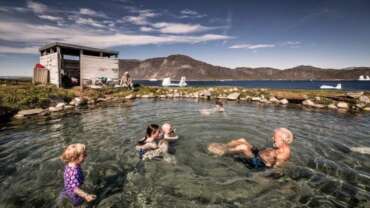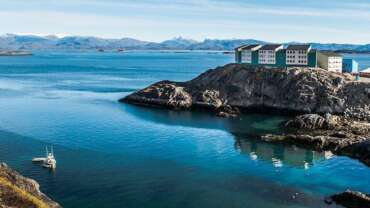East Greenland
Destination East Greenland is just a short flight from Iceland but its culture and landscapes are a world away. In a land dominated by the Ice Cap and impossibly steep mountain ranges, 3,500 people have made their home.
East Greenlandic culture is deeply rooted in myths and legends, often expressed in bone and rock carvings, but at the same time it is a globally connected culture with strong hunting roots and an everyday spirit of adventure.
Ice fiords, hiking, heliskiing, small settlements, northern lights, and boat rides combine to make East Greenland a year round destination, and the main town Tasiilaq also acts as the gateway for adventurers on longer climbing, kayaking, Ice Cap, and mountaineering expeditions in the rugged backcountry.
East Greenland is an isolated yet very special place. The language is different and the culture is deeply rooted in myths and legends, which is expressed in their much-coveted handicrafts.
ITTOQQORTOORMIIT
The most isolated town in Greenland, where dog sledding, expedition cruises and wildlife dominate the opportunities for adventure.
Ittoqqortoormiit is not quite like the other towns. For many guests, just getting to Ittoqqortoormiit is in itself an adventure, as the town is almost as far as one can get from any other inhabited area in Greenland. The closest neighbour is the world’s largest national park with the Danish Sirius Patrol as the only human presence in a vast landscape dominated by small game, birds, polar bears, musk oxen, reindeer, walrus and 18,000 kilometers of rugged, pathless coastline.
Furthermore, the city is right next to the world’s largest and deepest multi-branched fjord system, and a special basalt rock formation with horizontal lines running through the cliffs, is quite different from other parts of the country, marking the transition to the even more desolate area of Northeastern Greenland.
THE OCEAN AND THE ICE ARE KEY TO THE TOWN’S EXISTENCE
Even though the sea ice blocks ship access to the town for about nine months of the year, Ittoqqortoormiit has nevertheless become an important cruise destination for small expeditionary vessels exploring the nature, wildlife and culture of Northeastern Greenland.
Hunting and fishing at sea are the only ways the community can survive; in addition, the sea ice is like a road providing new routes through the countryside. During early spring, when the sea ice is still thick yet the sun is high in the sky, many of the local people will go out for a weekend on dog sledding or snowmobile trips. Tent camps and camping life are the norm for a short while, a reminder of the spring experience you will have when going out on the land with local guides. These tours reflect how tourism has evolved out of normal everyday activities by the local populace.
- Ittoqqortoormiit was founded in 1925 with settlers from Tasiilaq and a few families from West Greenland, in part, by Danish territorial demands on Greenland.
- The town has a population of 450 residents and the main source of income comes from hunting and tourism.
- The town has one grocery store and a couple of small convenience stores.
- The nearby National Park is the largest in the world and within its borders is the tallest mountain in the Arctic region, the 3,694 meter tall Gunnbjørn’s Mountain.
SUMMER AND WINTER IN ITTOQQORTOORMIIT
You can choose to up the level of adventure by joining long tours on dog sled out on Liverpool Land, north of the town, passing several huts of historical significance used for hunting or research. The huts hide a treasure trove of wilderness stories.
During the short but intense summer period, kayaks are available for renting. Both short trips and long hauls through the ice-filled strait by Ittoqqortoormiit provide access to the uninhabited settlements of Cape Hope and Cape Tobin, as well as to the inviting albeit somewhat chilly beach at Walrus Bay. Cape Tobin is also known by its Greenlandic name, Uunartoq, meaning “that which one burns oneself on” because it is the location of the hottest hot spring in Greenland. The water temperature in the spring is 62 degrees Celsius.
KULUSUK
Kulusuk is the gateway to different types of adventure-based activities for both summer and winter.
AN INTERNATIONAL AIRPORT SOMEWHAT ABOVE THE ORDINARY
How many places in the world are you aware of where the first step, after getting your bags off the baggage carousel and passing the tax free shop in an international airport, is a transfer on foot or with an all-terrain vehicle on a gravel road with a view to ice-filled fiords?
That is what we thought!
It is not enough that Kulusuk airport is on a mountainous island surrounded by ice-filled waters in the least populated part of the country. The airport town is not a roaring metropolis, but just a small settlement with a population of 250 people, for whom income gained from hunting and fishing is as important as any income from the airport.
But this is probably why you decided to come here in the first place. You are searching for a Greenlandic adventure experience, wanting to meet the local population in a small community with ample room for differences.
KULUSUK IS A DESTINATION IN AND OF ITSELF
Kulususk is the gateway to East Greenland, and the opportunities for adventures on and around the island cover everything from cultural encounters to extreme expeditions in summer as well as in winter.
Hiking trips make the island accessible along gravel roads which connect the airport with the settlement and even continue on up to a nearby hill, the 300 meter tall Isikajia Mountain. From the top of the hill there is a great view of the Denmark Strait, icebergs, the fjord system, Tasiilaq island and much of the area’s jagged coastline.
Day trips from Iceland have even put Kulusuk on the Map of Reykjavik as places one can spend an afternoon. However, we do feel that Greenland deserves a visit which is longer than just one day. You will surely discover this yourself when you land in Kulusuk.
- There is grocery store in the settlement with a regular supply of food and household items in the summer time. During the winter months supplies dwindle as the frozen pack ice blocks any shipping of goods to East Greenland by boat.
- There is plenty of game in the area. In the 1930s, Kulusuk had a larger population than Tasiilaq. Tasiilaq has since grown substantially and now has a population of 2.000 inhabitants.
- The airport was built by the US Air Force in 1956 as part of the early warning defense system.
- Kulusuk is both an airport with connections to Tasiilaq, Nuuk and Reykjavik as well as a settlement with a population of 250 residents on Kulusuk island.
- The settlement was previously known by the Danish name, Kap Dan.
- The Kulusuk hostel is tailored for the hikers visiting the area, but at the same time opens up a convenient opportunity for the general traveller in East Greenland.
- Hotel Kulusuk lies between the airport and the settlement with a view to the fjord. The hotel offers transfers to and from the airport, and it is a fully modern hotel with a restaurant, internet and several offers of tours in the area.
ADVENTURES ON, AND AROUND, KULUSUK ISLAND
In the settlement itself there is a focus on offering cultural events such as meetings with local story tellers and kayakers, guided tours, lectures in the renovated church building, traditional East Greenlandic drum dancing, and visits to the renowned artists in Kulusuk, highly lauded for their Tupilak figurines.
Tasiilaq, the largest town on the east coast, is only ten minutes by air from Kulusuk with an Air Greenland helicopter, or an hour by boat, if the weather conditions are optimal. You will discover that the two places together make for a strong destination with many tour possibilities throughout the year.
Guided boat tours weaving between icebergs, transfers to a distant mountain valley and flightseeing with Air Zafari in their specially designed aircraft are all part of the summer program, while dog sledding and Northern Lights are among the most important winter excursions.
Guided boat tours weaving between icebergs, transfers to a distant mountain valley and flightseeing with Air Zafari in their specially designed aircraft are all part of the summer program, while dog sledding and Northern Lights are among the most important winter excursions.
TASIILAQ
The largest town in Eastern Greenland is the gateway to pretty much every kind of experience Greenland offers.
ISOLATED, YET ACCESSIBLE
If, for a moment, you are able to tear your gaze away from the mountain tops, the icebergs and all the great opportunities for adventure, you will discover that you are standing in Tasiilaq and looking out over King Oscar’s Harbour in East Greenland.
Around you is a town, which in spite of its only 2,000 inhabitants, is the gateway to a plethora of summer adventures on foot, in kayak, by boat or in the air, and then there are the winter adventures like dog sledding, skiing, heliskiing and snowmobiling.
East Greenland, and specifically Tasiilaq, is viewed as the ”front side” of Greenland or the “face towards the world” by many visitors. The region has nearly 50 years of experience with tourism and the regular flight connections to Reykjavik via the airport in Kulusuk ensure Tasiilaq’s accessibility to the outside world.
ADVENTURES IN TASIILAQ
Everything seems a little bigger in Tasiilaq. The mountains, the distances, the adventures, the challenges loom and beckon both summer and winter.
The hiking, climbing expeditions, kayak adventures, whale watching, visiting settlements, boat tours to the icefjord called Sermilik in summer, as well as the cultural events in the town itself, all mix with a layer of local culture, that gets its energy from the numbers of people from the settlements, who come into town throughout the summer. They visit family and friends, participate in the very popular coastal soccer championship and fill the streets with life and activity.
In winter, experiences range from urban introductions to dog sledding to snowmobiling trips to the nearby settlement called Tiniteqilaaq. Also within the realm of possibility is downhill skiing with snowmobile support, multi-day trips by dog sled, the opportunity to get one’s own dog sled license, week-long heliskiing adventures in remote mountain areas, and the ultimate challenge of crossing the Ice Cap from the settlement of Isortoq in East Greenland to Kangerlussuaq in West Greenland.
- Tasiilaq means “the place with a lake” (because of the shape of the fjord).
- It is the largest town on the east coast with a population of about 2,017 (2013) and is one of the fastest-growing towns in Greenland.
Tasiilaq, or the island where Tasiilaq is located, was formerly known as Ammassalik or Angmagssalik, Greenlandic for “the place with capelin”. - Tasiilaq is located approximately 106 km (65.9 mi) south of the Arctic Circle.
- One day’s hike from the town is the Sermilik Station (a glacier research base).
- Palo´s Wedding, the first Greenlandic movie, was shot in Tasiilaq. So was the music video ‘Infinitely You’ by Simon Lynge.
- Around seven or eight supply ships go to Tasiilaq each year. The first arriving at the beginning of June and the last mid- or at the end of November.
- People go out to sea on their own boats to scout for the supply ship and when spotted, three cannon shots are fired to welcome the ship with the new supply of food. Some of the locals go down to the harbor to greet the ship. First things out of the ship are fruits and veggies, then the candies!
MANY ROADS IN A COUNTRY WITH NO HIGH WAYS
We often hear people describe Greenland as a country without roads, and it is true that we don’t have any roads in the traditional sense between cities or along the coastline. Whoever claimed that gravel and asphalt has a monopoly on the definition of “road”?
East Greenland is a clear example of how the local population combines everyday experiences with traditional knowledge of the land and modern day GPS equipment to navigate waterways, dog sled routes, hiking paths and snowmobiling trails.
The many hiking tours in the Tasiilaq area that last for several days, often get transport support from passenger boats, when crossing straits or particular impassable parts of the coast line. The easiest way to travel between local communities is by boat. The roads of winter are often trails across frozen fjords, and mountain climbers will go by boat to distant areas before they find a way to climb the alpine mountain tops.
ARTS AND CRAFTS AND STREET LIFE
Artistic life in East Greenland is characterized by a continuation of craft traditions used in earlier times to decorate weapons used for hunting, household tools or masks.
Current arts and crafts draw on a wide range of regional creative expressions, and the East Greenlandic tupilak figurines are especially known for their quality in design and form, not only in Greenland, but internationally as well.
At the same time Tasiilaq draws the youth of the area as a magnet, in spite of the town’s modest size, and the youth use the town as a platform for music, adventure sports, photography and other typically modern ways of expression.



